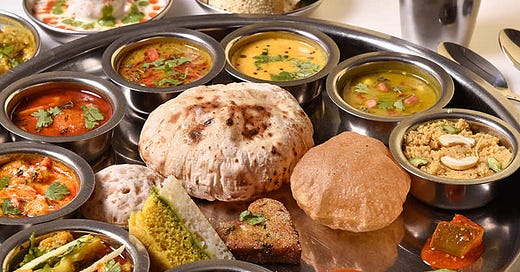Harmony on the Plate: Unveiling the Ancient Roots of Vegetarianism in India
Explore the Roots of Vegetarianism in Ancient India: Discover the Spiritual, Culinary, and Timeless Wisdom Behind a Plant-Based Lifestyle. #AncientWonders #Vegetarianism #IndianCuisine
Few lifestyles have stood the test of time as steadfastly as vegetarianism in the rich tapestry of human nutritional choices. It's important to understand that vegetarianism has historic origins, even if the conscious choice to avoid meat has gained a lot of popularity recently for ethical, environmental, and health-related reasons.
In this edition of "Ancient Wonders," we embark on a historical voyage through the multicolored terrain of Ancient India, unraveling the threads that weaved the fabric of vegetarianism into the subcontinent's cultural and spiritual tapestry.
Historical Foundations of Vegetarianism in Ancient India
Vegetarianism has its roots in the rich cultural and religious traditions of ancient India, which date back thousands of years. There are allusions to a diet high in grains, fruits, and dairy goods throughout the Vedas, the ancient holy texts of Hinduism.
The Indian people's eating tastes were significantly influenced by the concept of "ahimsa," or non-violence, which became a pillar of Indian philosophy.
As one of the oldest Vedic writings, the Rigveda extols the benefits of a plant-based diet, highlighting the interdependence of all living things and promoting kindness toward animals.
This philosophical position served as the basis for the growth of vegetarianism as a lifestyle in ancient India.
Religious Influence: Jainism and Buddhism
Vegetarianism received further support from Ancient India's religious environment. Gentleness and reverence for all living things are central to the teachings of Jainism, an old Indian faith that existed before even Buddhism.
cause as little harm as possible to living things, Jains adhere to a strict vegetarian diet that forbids both meat and root vegetables.
Around the same time as Jainism, Buddhism also arose, and one of its core ethical tenets was vegetarianism. Buddhism's founder, Siddhartha Gautama, promoted a way of living that lessened harm to sentient beings.
Millions of people changed their diets as a result of the seeds of vegetarianism that Buddhism brought throughout India and beyond.
The Culinary Artistry of Ancient Indian Vegetarian Cuisine
The culinary landscape of Ancient India transformed into a vibrant tapestry of flavors, colors, and nutritional richness as vegetarianism became engrained in the country's religious and cultural fiber.
Indian food from antiquity showed an unmatched talent for turning basic ingredients into delectable meals that nourished the body and soul in addition to pleasing the tongue.
Indian cuisine offers an abundance of flavorful and nutritionally dense foods due to its wide use of spices, herbs, and various plant-based ingredients.
Vegetables, grains, beans, and lentils were expertly blended with flavorful spices to create dishes that satisfy vegetarian diet requirements while tasting great.
Ancient Indian Texts on Vegetarianism
Ancient Indian writings such as the Dharmashastras and Arthashastra explore the moral and practical implications of vegetarianism. These writings, which functioned as manuals for moral behavior and political leadership, placed a strong emphasis on the benefits of a vegetarian diet for promoting social harmony, mental clarity, and spiritual development.
One of Hinduism's most important legal and ethical texts, the Manusmriti, offers rules for living virtuously, including what to eat.
It emphasizes how eating a vegetarian diet is good for one's physical and mental health as well as moral integrity. These teachings placed a strong emphasis on the interconnection of all life forms and the ahimsa concept.
Legacy and Modern Resonance
Vegetarianism in Ancient India has a lasting legacy that transcends both space and time. With the globe facing health issues, ethical dilemmas, and environmental difficulties, the ancient Indian vegetarianism philosophy has more relevance than ever now.
Those who are looking for a sustainable and aware way of living are still motivated by the ahimsa, compassion, and mindful living ideas that the sages and philosophers of ancient India promoted.
Conclusion
A historic Indian practice of vegetarianism that has weathered the test of time stands out as a wise and timeless addition to the mosaic of human dietary choices. The vegetarian lifestyle of Ancient India was not just a gastronomic choice but a profound statement about the interdependence of all life, rooted in profound intellectual and theological traditions.
Reminiscent of Ancient Indian wisdom, our actions affect not just our health but also the health of the earth and all its inhabitants as we negotiate the complexity of the modern world.





Actually, in the Vedic period and even after meat was consumed; Aryans were not given to a wholly grain-based diet. The meat however was consumed only after sacrifical offering. The references to this abounds in the Vedas. even the Arthashastra of Kautilya s silent on dietary preference. It is the Jains who were the first animal liberationists in India; they even came up with the trope ahimsa, by adding the negative copula to himsa involved in sacrificing animals and excessive amounts of food items. Then Buddhism in India (only) adopted vegetarianism, mostly under the impact of Emporer Ashoka. Together they influenced Hinduism to turn towards adopting ahimsa as a moral principle and apply it to all species; vegetarianism is a consequence of this moral principle (as Peter Singer has argued in launching the animal liberation movement in the west, and he invokes the Jains and Ashoka against the Hindus quite regularly). So how India embraced vegetarianism which is on the decline in India and on the rise in Europe and America is the different story to the one yuo have provided.